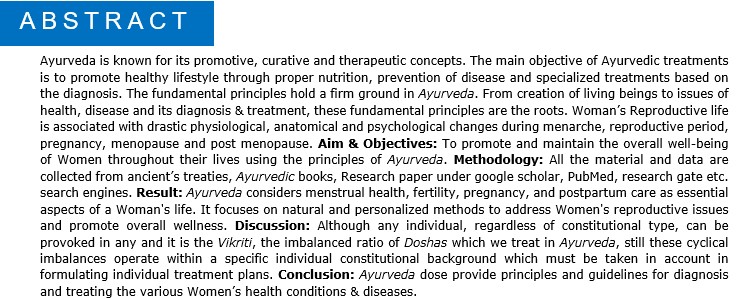An empirical review of fundamental principles of Ayurveda for women’s reproductive health and diseases
DOI:
https://doi.org/10.21760/jaims.8.9.17Keywords:
Women’s Reproductive Health, Prasuti Tantra & Stri Roga, Clinical Aspects, Tridosha, Dhatu, AgniAbstract
Ayurveda is known for its promotive, curative and therapeutic concepts. The main objective of Ayurvedic treatments is to promote healthy lifestyle through proper nutrition, prevention of disease and specialized treatments based on the diagnosis. The fundamental principles hold a firm ground in Ayurveda. From creation of living beings to issues of health, disease and its diagnosis & treatment, these fundamental principles are the roots. Woman’s Reproductive life is associated with drastic physiological, anatomical and psychological changes during menarche, reproductive period, pregnancy, menopause and post menopause. Aim & Objectives: To promote and maintain the overall well-being of Women throughout their lives using the principles of Ayurveda. Methodology: All the material and data are collected from ancient’s treaties, Ayurvedic books, Research paper under google scholar, PubMed, research gate etc. search engines. Result: Ayurveda considers menstrual health, fertility, pregnancy, and postpartum care as essential aspects of a Woman's life. It focuses on natural and personalized methods to address Women's reproductive issues and promote overall wellness. Discussion: Although any individual, regardless of constitutional type, can be provoked in any and it is the Vikriti, the imbalanced ratio of Doshas which we treat in Ayurveda, still these cyclical imbalances operate within a specific individual constitutional background which must be taken in account in formulating individual treatment plans. Conclusion: Ayurveda dose provide principles and guidelines for diagnosis and treating the various Women’s health conditions & diseases.
Downloads
References
Flavia Bustreo, Assistant Director General for Family, Women’s and Children’s Health through the Life-course, World Health Organization, 20 February 2015.
Fathalla MF. 1988. Research needs in human reproduction
In: Research in Human Reproduction: Biennial Report (1986-1987). Edited by E. Diczfalusy, P.D. Griffin & J. Khanna. World Health Organization, Geneva.
P.V. Sharma, Charak Samhita Text with English translation, Chaukhambha Orientalia, Varanasi. Reprint edition 2017, Pg no 12.
Shubhash Ranade, A Text Book of Sharira-kriya Vijnan Part-1, Chaukhambha Sanskrit Pratishthan, Delhi. First edition 2007, Ch 3, pg no 32.
Brahmanand Tripathi, Ashtang Hridaya, Chaukhambha Sanskrit Pratishthan, Delhi. 2017, Ch 12/9.
Harishchandra Singh Kushvaha, Charak Samhita of Agnivesa with Ayurveda Dipika Commentary of Chakrapani Datta, Chaukhambha Orientalia, Varanasi. 2016, Cha.Sha.8/6.
Ambikadattashashtri, Sushrut Samhita with Ayurvedatatva sandipika Commentary, Chaukhambha Sanskrit Pratishthan, Delhi. 2018, Su.Su.14/7.
Harishchandra Singh Kushvaha, Charak Samhita of Agnivesa with Ayurveda Dipika Commentary of Chakrapani Datta, Chaukhambha Orientalia, Varanasi. 2016, Cha.Vi.8/122.
Gudipally PR, Sharma GK. Premenstrual Syndrome. 2022 Jul 18. In: StatPearls [Internet]. Treasure Island (FL): StatPearls Publishing; 2023.
Ambikadattashashtri, Sushrut Samhita with Ayurvedatatva sandipika Commentary, Chaukhambha Sanskrit Pratishthan, Delhi. 2018, Su.Sha.3/7,8.
Brahmanand Tripathi, Ashtang Hridaya, Chaukhambha Sanskrit Pratishthan, Delhi. 2017, Ah.Su.1/19.
Shubhash Ranade, A Text Book of Sharira-kriya Vijnan Part-2, Chaukhambha Sanskrit Pratishthan, Delhi. First edition 2007, Ch 1, pg no 8.
Premvati Tiwari, Prasutitantra Part-1, Chaukhambha Orientalia Varanasi. 2011, Chapter 2 & 11.
Shubhash Ranade, A Text Book of Sharira-kriya Vijnan Part-1, Chaukhambha Sanskrit Pratishthan, Delhi. First edition 2007, Ch 15, pg no 199-200.
Lonsdorf, Nancy, Veronica, A Women’s Best Medicine, Tarcher, Log Angles. 1993.
Lad, Vasant, David, The Yoga of Herbs, Lotus, Santafe, 1986.
Bhardwaj Vikas, Sharma Pankaj, Panchamahabhuta Siddhanta and Chikitsa - A Bird’s eye View, An International Journal of Pharma, Medical & Biological Sciences, Vol 1, Issue 11, 154-159.















